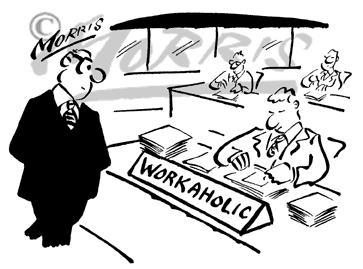Work Life Balance: "Shall we go home now or wait a little longer?"
 Years ago I had an unusual conversation. “Well” I said to one of my bosses “I think I’m off home now, it’s time to go.” “I’m not” he replied, “if I arrive now, I have to bath and give the children their supper. I have four of them. Wait a while and at half past nine I’ll be in the clear”. How many times have you had a similar conversation? And, without wanting to point the finger… maybe you have fallen into the same trap?
Years ago I had an unusual conversation. “Well” I said to one of my bosses “I think I’m off home now, it’s time to go.” “I’m not” he replied, “if I arrive now, I have to bath and give the children their supper. I have four of them. Wait a while and at half past nine I’ll be in the clear”. How many times have you had a similar conversation? And, without wanting to point the finger… maybe you have fallen into the same trap?
This is today’s topic: “long and hard” work days… do they correlate to a real working need or are they simply an excuse to disappear and not face up to your own personal life? Don’t be fooled: in terms of organisational behaviour, one (working 16 hours a day; because it is overwhelming) is as bad as the other (not going home because your children, your couple or your dog give you more problems that joy).
That’s why it’s interesting to understand the factors (personal, organizational, or cultural) that push people to work from sun up to sun down. The problem is not how much some people hurt themselves; the problem is how much they can hurt “the others”.
1. The absence of personal and family life. Anyone who has experienced domestic chores knows how hard it is to be one hundred percent alert, 24 hours a day, to look after, calm, hold and protect the “little people” that crawl around the house. “Blessed office!” a friend of mine commented one Monday, after having had to deal with her children and their cousins over a long weekend. And we shouldn’t fool ourselves: for those who haven’t developed special life skills (patience, ability to play, soft skills…) it is more difficult and causes more stress when trying to understand children, than when negotiating with any boss or colleague at work. And, if in addition to the kids, you add a spouse or sentimental companion to the mix… things can get even more complicated. Through this reasoning, I am certain that a difficult family life could end up causing an unnecessary extension in the working day.
2. The ego or the feeling of importance that could come with certain positions. Sometimes you get home and they don’t say “yes” to everything you say, they don’t recognise your authority, they argue over decisions and even go as far as to say that your proposal to fix the situation with the children is complete idiocy. And suddenly you realise that you are not in charge at home and that you are on the receiving end and not the one calling the shots. And if this is the case not just one, two or three days but rather for a long time… maybe it’s better to be in a less hostile environment.
3. The difficulty or incapacity of some corporations to find new ways to “evaluate effort”. As it is usually difficult to find something objective with which to measure work unrelated to sales and “that anyone could do”, we usually fall back on hours as a typical yardstick. It isn’t the best way since sometimes it helps but at other times it generates distortions. While what is measured is the same (hours worked), we can see that many people just keep their seats warm. I believe that Henry Bersong, the philosopher, was right: “the important thing is not the duration of things, but the intensity of the time spent”. But obviously, we also have to recognise that it is not unusual to find someone watching the clock, punch card in hand, waiting to clock the exact leaving time that are capable of balancing their timetable right down to the very last minute.
4. The cultural factors. In this respect, food is an excellent cultural indicator. For instance, in Spain, it is normal to spend up to two hours every day having lunch: two dishes, dessert, a digestif, coffee, cigar and wine at your discretion. I remember, years ago, the confusion of a North American friend when we arranged a meeting “first thing in the afternoon”, meaning 5pm. His response was succinct: “I don’t understand you” he said, “Here you start work at the same time as we, in my country, go home.” What’s more, the whole lunch thing has other repercussions: the two hours of lunch for the managers results in a kind of perverse black hole for productivity: you aren’t seen, nor does that time count as you being “available”. “I know that you spend a lot of time here”, said a senior manager to his assistant, “the problem is that you aren’t here when I need you”. Sad but true.
And that is the reality. It’s not a good situation. Work takes up a lot of time, sometimes more time than you have. That is an incontrovertible truth. But make no mistake: don’t use it as a permanent excuse to disappear from your life: there is always something you can do. The limits are often in your head, and you can change them.
Extract of a post published in the daily paper “Diario 5 Días” October 19th, 2001










